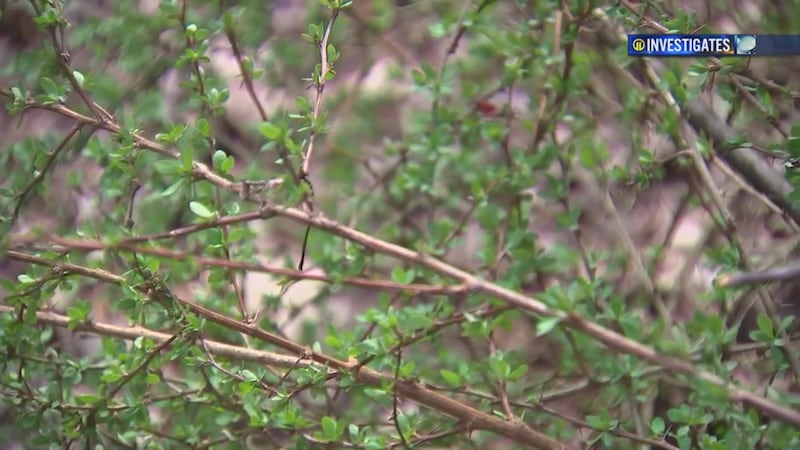PITTSBURGH — As temperatures outside rise, many people are heading to nurseries to buy plants to beautify their yards. But there is a shrub available that, while beautiful in a landscape, has become a hazard. It's called Japanese barberry, and what 11 Investigates found out about it may have you thinking twice about planting it.
Dr. Ryan Utz teaches ecology at Chatham University, and is also working to educate the public about the dangers of Japanese Barberry, which is aggressively colonizing Pennsylvania forests.
Chatham University Barberry Study
Barberry is loaded with sharp thorns, so deer don't touch it. It's also easy to grow, tolerant to both sun and shade, and drought-resistant, which makes it a popular garden plant. Birds eat the berries and drop them in the woods and that's where the trouble begins.
Utz and Chatham student Trey Turnblacer co-authored a study that showed Japanese barberry reduces the abundance of native tree seedlings by 85 percent, which endangers suburban forests.
PREVIOUS CHANNEL 11 INVESTIGATIONS:
- After 30 years, woman speaks about serial killer's attack
- Student facing charges after trying to bring heroin into school
- Pittsburgh to fix bridge littered with potholes connecting city to McKees Rocks
- VIDEO: Are mini-casinos worth the gamble?
"What is really alarming, what our research tells us, is that underneath that green you see there now, there are very few young trees coming up," said Utz.
"If it does escape to the forest landscape, is that eventually it can potentially wipe out the entire forest," said Turnblacer.
Chatham University Barberry Warning
The leaves of the Japanese barberry are purple in yards, with red berries appearing in the fall.
The Japanese barberry is not just an ecological concern, it's a health concern as well. The shrub acts as a nursery for deer ticks, which can carry Lyme Disease. Pennsylvania is home to one third of all Lyme Disease cases in the United States, and studies have shown that not only are more deer ticks found in Barberry patches, those ticks are more apt to carry Lyme.
Japanese barberry is banned in some states, including Maryland, Massachusetts, and New Hampshire. 11 Investigates reached out to the Pennsylvania Bureau of Forestry, which said that while Japanese barberry is classified as an invasive species, it is not banned. In fact, 11 Investigates found it's being sold at several local nurseries.
"They don't want plants banned from their shelves because they're making money on it," said Utz.
Utz and his team said they want to see nurseries voluntarily stop selling Japanese barberry, but that's unlikely to happen without pressure from the state. Until then, Utz and his team are appealing to homeowners and landscapers not to buy the plant. If you already have it planted, ecologists would like to see you get rid of it. To do that, you would have to cut it down to the ground, and then also apply an herbicide like Roundup, or hit it with a blowtorch to kill the roots.
TRENDING NOW:
- First Lady Melania Trump undergoes kidney surgery
- Woman shot, killed in mother's driveway
- Boy, 10, bitten by shark at Hilton Head beach
- VIDEO: Dogs Rescued Near Lava After Missing for 10 Days
Cox Media Group








